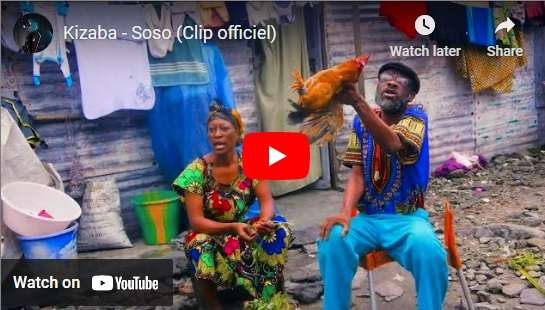As the year comes to a close, Lionel Kizaba will go on his holiday break with a sense of accomplishment. “This year has really been the best year of my life,” he enthuses, pointing out the 30-odd concerts he’s performed, in Québec and elsewhere in the world, over the past 12 months, as well as the Nov. 18, 2022, release of Kizavibe, his new electronic Afropop album — co-written and co-produced with his partner in crime, Gone Deville.
For the singer-songwriter and drummer from the Democratic Republic of Congo (DRC), 2022 ended as it had more or less begun: with an invitation to the Mundial Montréal/M for Montréal Festival. He explained where the starting line of this creative cycle was: “The Mundial concert in 2021 set the table for the year to come, which I ended with a big concert at the Society for Arts and Technology [SAT] for the album launch,” as an after-party for M for Montréal.
“The festival director, Sébastien Nasra, had seen my concert at Mundial, and he said to me, ‘I thought you played African music, but it’s pop!’,” hence the invitation to the following year’s edition of M for Montréal. The director’s observation illustrates just how far pop music from the African continent has come in recent years, by shedding the divisive and outdated “world music” label, and finally being recognized for what it is: damn good, danceable, modern pop that deserves its spot on the world’s biggest stages, as Nigeria’s Burna Boy did last summer at Osheaga, or as fellow Nigerian Wizkid will do on March 18, 2023, at Bell Center.
Kizaba wades in those very waters, cooking up a stew of pop, rap, and danceable electronic music, spiced with rhythms of his native Congo, chiefly soukous and rumba. “I put a lot of work into this,” says Kizaba. “I wanted to take the Congolese sound to another level by combining it with other musical styles. I wanted to offer diversified musical influences, because I don’t want only Congolese people to attend my shows, I want everyone to attend, all of Québec, the whole world. What I’m proposing is the whole universe!”
That universe begins in Montréal — literally: it’s the title of the Kizavibe’s sweet opening song, a love letter to his city, he says, “to the vibe here, to the artists I’ve met here, like brother Pierre Kwenders,” a Congolese at heart, also featured on the dancehall duet “Bella”. “Of all the cities I’ve visited, I say Montréal is the best — it has the best vibe, there’s so much music to discover, it has an incredible togetherness. I needed to pay tribute to all that.”
Kizaba created his 2017 debut album entirely on his own. “For this one, I really wanted to be able to rely on a second pair of ears.” he says. A friend put him in touch with composer and DJ Gone Deville (Pierre Belliveau), who was looking for a percussionist to accompany him at an event he was organizing. They clicked right away. “Pierre told me, ‘Lionel, I’m not letting go of you, I’ll follow you anywhere you go!’ He let me hear some beats he was working on, I chose a few more from his bank and that was the basis of the album,” recorded in Montréal and partly in DRC.
Gone Deville is also the technical director for Kizaba’s concerts, and they spent 2022 playing in many different time zones: “After my concert at Mundial Montréal, I was invited to play in a lot of big concerts — in the United States as an opening act for Lionel Richie, we toured Louisiana, Great Britain, Italy, British Columbia. . .” The coming year will also be bookings-rich with the tour resuming on January 12, 2023, including a presence at this year’s edition of the prestigious WOMAD festival in April in Chile.

